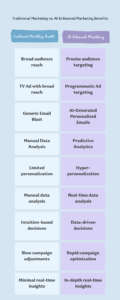
Introduction:
AI in digital marketing is revolutionizing the landscape, transforming how businesses engage with their audiences. Imagine AI as your ingenious assistant, adept at discerning consumer preferences and crafting marketing campaigns that resonate effortlessly. AI transcends mere reaction; it anticipates. It possesses an uncanny ability to foresee consumer desires, like a mystical crystal ball. This paradigm shift is monumental for businesses, enabling them to dynamically adapt strategies in real time, attuned to evolving market sentiments. We’re witnessing the dawn of a new era. AI in digital marketing is taking control, transforming raw data into invaluable insights. It turns businesses into savvy storytellers, leveraging technology to captivate audiences. Embrace the future of marketing, where AI reigns supreme in digital engagement.
Exploring AI’s Role in Digital Marketing: A Beginner’s Perspective
In today’s fast-changing digital world, AI in digital marketing is transforming how businesses approach their strategies. AI enhances customer experiences and aids smart decision-making. It’s a must-have tool that boosts a brand’s online success. Businesses want to connect better with their audiences, and AI is the key. Let’s explore how AI is changing digital marketing. It personalizes customer experiences and uses data to predict trends. AI in digital marketing is reshaping how brands reach their customers, making marketing smarter.

Understanding the AI-Powered Digital Marketing Revolution
AI, once a futuristic idea, has seamlessly become part of digital marketing, changing how businesses connect with their audience and analyze data. Search Engine Optimization (SEO), a crucial part of online success, has evolved with AI. Google and others now use AI algorithms that consider user intent, search history, and semantic search to provide more relevant search results.
- Using AI for Content Creation Optimization In today’s information-packed world, creating engaging content is vital. AI tools can study vast amounts of data to find trends, helping businesses create content that speaks to their audience. Natural Language Processing (NLP) algorithms let content creators understand their audience’s language and intent, making content more interesting and specific. AI also helps improve content for search engines by including keywords that match what people search for, increasing the likelihood of content appearing higher on Google.
- Personalizing User Experiences Traditional marketing messages are gone. AI-driven personalization means businesses can create unique experiences for each user. Thanks to Machine Learning, brands can analyze user behavior, preferences, and purchase history to suggest products and offers that users want. This enhances user satisfaction and drives business growth.
- Analysing Data and Predicting Trends The internet generates vast amounts of data, and AI can help make sense of it. AI tools can analyze this data to find patterns and insights that benefit businesses. Predictive Analytics uses historical data to predict future trends, helping businesses make informed decisions and stay ahead of the competition.
- Chatbots and Talking with Customers AI-powered chatbots are changing how businesses interact with customers. They’re always available to help and answer questions quickly. AI chatbots can handle routine queries, freeing up human agents to tackle more complex tasks.
- Improving Paid Ads AI is enhancing the effectiveness of paid ads. With AI, ads can be dynamically adjusted based on user preferences and behaviors, making them more likely to succeed. AI also helps in selecting the best ads and targeting the right audience.
How AI Reshapes Digital Marketing Strategies: A Beginner’s Overview
In today’s evolving digital landscape, AI drives transformative changes in marketing. Beginners need to understand AI’s role and impact. AI is reshaping how businesses engage audiences.
- AI-Powered Customer Insights: AI analyzes consumer behavior for targeted campaigns, enhancing audience understanding.
- AI-Driven Content Creation: AI-generated content streamlines creation, aiding blog posts, social media captions, and more.
- Predictive Analytics for Trends: AI predicts trends, aiding proactive strategy adjustments.
- Chatbots and Customer Engagement: AI chatbots provide instant support, enhancing user satisfaction.
- Visual Recognition and Branding: AI analyzes visuals, elevating branding and visual appeal.
- Enhanced Email Marketing: AI optimizes email campaigns, tailoring content for higher engagement.
- Voice Search and SEO: AI adapts SEO for voice search, optimizing content for voice queries.
- AI and Social Media Insights: AI analyzes social media, providing insights for strategic social engagement.
- Automated Ad Campaigns: AI automates ad campaigns, targeting audiences for maximum impact.
- Ethical Considerations of AI: Address AI ethics, discussing data privacy, algorithm transparency, and bias mitigation.
Impact of Artificial Intelligence on Digital Marketing: Insights for Beginners
AI is reshaping digital marketing, revolutionizing how businesses connect and achieve results.
- Personalization and Engagement: AI tailors experiences by analyzing user data, driving engagement and satisfaction through personalized content and recommendations.
- Precision Data Analysis: AI’s ability to process vast data swiftly uncovers insights, empowering precise decision-making and effective resource allocation.
- Optimized Content Strategy: AI-driven insights refine content creation, ensuring resonance with audiences and boosting visibility and reach.
- Revolutionizing SEO: AI algorithms reshape SEO by interpreting user intent, and enhancing content visibility and relevance in search results.
- Predictive Strategy: AI predicts trends and consumer behaviors, enabling proactive strategy adjustments for sustained competitiveness.
- Enhanced Customer Interaction: AI-powered chatbots provide real-time assistance, elevating user experience and nurturing customer relationships.
- Data-Driven Advertising: AI refines ad targeting through data analysis, ensuring ads reach the right audience, maximizing impact and ROI.
- Ethical Considerations: As AI’s role expands, addressing data privacy and transparency becomes pivotal to maintaining trust.
Benefits and Drawbacks of AI in Digital Marketing: A Beginner’s Analysis

In the evolving landscape of digital marketing, AI is transforming strategies. For beginners, understanding AI’s advantages and disadvantages is vital for informed decisions.
Benefits of AI in Digital Marketing:
- Enhanced Personalization: AI analyzes user data for tailored engagement, boosting satisfaction through personalized experiences.
- Data-Driven Insights: Swift AI analysis uncovers trends, informing decisions and efficient resource allocation.
- Efficient Content Creation: AI aids content generation, crafting impactful materials with efficiency.
- Precise SEO Strategies: AI algorithms enhance visibility by interpreting user intent and optimizing content.
- Predictive Analytics: AI predicts trends, enabling proactive marketing adjustments for sustained relevance.
Drawbacks of AI in Digital Marketing:
- Data Dependency: AI relies on data accuracy; incomplete or biased data can lead to flawed insights.
- Privacy Concerns: Using user data for personalization requires transparent handling to avoid privacy issues.
- Initial Costs: AI implementation requires investment, which can be a barrier for some businesses.
- Human Touch: While efficient, AI may lack the human element required for genuine customer relationships.
- Algorithm Bias: AI algorithms can carry biases, affecting fairness in targeting or decisions.
The Future of AI in Digital Marketing
As technology advances, the role of AI in digital marketing continues to grow. From voice search to virtual reality, the opportunities are vast. To stay ahead, businesses must leverage AI for innovation and growth.
Conclusion
AI has changed how businesses connect and succeed in digital marketing. With AI tools, businesses can create great content, personalize experiences, and use data for smart decisions. The future belongs to those who embrace AI’s transformation and innovation in their marketing strategy.
What is AI in digital marketing, and how does it work?
AI, or Artificial Intelligence, in digital marketing, refers to the use of advanced algorithms and machine learning techniques to automate tasks, analyze data, and make predictions. It works by processing large volumes of data to identify patterns, trends, and insights that can be used to optimize marketing strategies and improve campaign performance.
How does AI impact data analysis and predictive analytics in digital marketing?
AI empowers marketers to analyze vast amounts of data quickly and accurately, uncovering valuable insights and trends that can inform strategic decisions and campaign optimizations. Predictive analytics algorithms use historical data to forecast future outcomes, enabling marketers to anticipate market trends, identify opportunities, and mitigate risks effectively.